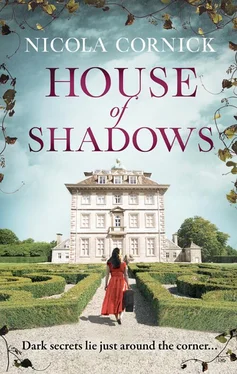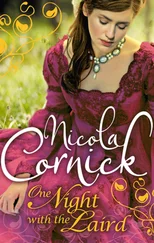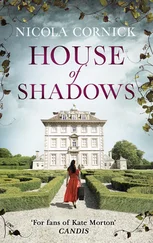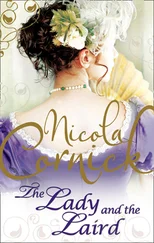Elizabeth shivered, clutching the edge of her cloak closer to ward off the cold. Below she could hear the sound of water now; when the well was full the overflow from the Bosbeek, the forest stream, flowed through an arched drain and out into the Hofvijver Lake. Tonight it sang softly as it ran. The music of the water was a good omen. Frederick would be pleased.
Another step and she passed the guardroom on the left. Shadows shifted behind the half-open door. She held her breath and trod more softly still, down towards the sacred well.
At the bottom of the spiral stair the space opened out into a room with a vaulted ceiling held aloft by stone pillars. It was familiar to her, as were the items on a table to the right: a bible, a skull, an hourglass, a compass and a globe, the tools of the Knights’ trade. Flames burned high in a wide stone fireplace, the golden light rippled over the water of a star-shaped well in the opposite corner of the room. The Knights were kneeling around the edge. The well had a shallow inner shelf and Elizabeth knew they would have placed the Sistrin pearl on that ledge, in its natural element of water. They were waiting for the jewel to exert its magic and reflect the future in the crystal mirror.
Light fractured from the crosses each man wore, some silver, some a soft rose gold that seemed to glow with a radiance of its own. Elizabeth could see the mirror in Frederick’s hand, the diamonds shining with the same dark fire as the crosses. She did not look at the reflection in the glass itself. She feared the mirror’s visions.
The heat was overpowering and the air laden with smoke and the sweet-woody scent of frankincense. The sun, moon and stars on the knights’ robes seemed to spin before her eyes. Her head ached sharply. Caught off guard, Elizabeth took a step back. She put out a hand to steady herself against one of the stone pillars but met thin air.
Someone caught her from behind, his hand over her mouth, one arm about her waist, pulling her out of the room, swinging the door shut behind them. It was sudden and shocking; no one touched the Queen, least of all manhandled her. Instinct took over; instincts she did not know she possessed. She bit down hard, tasting the tang of leather against her tongue, and he released her at once, though the bite could not have hurt and nor could her feeble attempts to lash out with boots or elbows.
‘Hellcat.’ His voice was deep and he sounded amused, as though her puny efforts were pitiful. She was the one who was angry and she allowed herself to indulge in it.
‘You fool.’ She spun around to face him. She was shaken, ruffled, more than she ought to have been. ‘Don’t you know who I am?’
She saw his eyes widen, hazel eyes, which held more than a hint of laughter. In the flaring torchlight she could see he was of no more than average height, which still made him several inches taller than she. He looked strong though, and durable. His hair was a rich chestnut, curling over the white lace of his collar, his nose straight, a cleft in his chin. And even in this moment of stupefaction, even as he recognised her, there was still amusement in his face rather than the deference he should be showing her.
‘Your Majesty.’ He bowed.
She waited, haughty. His lips twitched.
‘Forgive me,’ he said smoothly, after a moment. Nothing more, and it did not sound like a request, still less like an apology.
He was young, this man, a good deal younger than she was, possibly no more than two- or three-and-twenty. Elizabeth thought she recognised him, though she did not know his name. She could see he was a soldier not a courtier. Unlike the Knights of the Rosy Cross he was clad plainly in shirt, breeches, cloak and boots. There was a sword at his side and a knife in his belt.
Heat and sudden tiredness hit her again, making her sway. Perhaps her ladies had been right, damn them. She was six months pregnant and should have been resting.
The expression in his eyes changed from amusement to concern. He took her hand, drawing her forwards.
‘Come into the guardroom—’
‘No!’ She hung back. ‘I don’t want anyone to see me …’
‘There is no one here but me.’
She allowed him to usher her through the door into the small chamber. It was Spartan, with a bare floor and one candle on a battered table. A meagre fire glowed in the grate. It was no place for a Queen but there was a chair, hard and wooden, and Elizabeth sank down onto it gratefully.
‘You are guarding the ceremony alone?’ she asked.
‘I am.’ He looked rueful. ‘Badly, it would seem.’
She smiled at that. ‘You could not have anticipated this.’
‘That the Queen herself would choose to come and watch?’ He shrugged, half-turning aside to pour her a cup of water from the carafe on the table. ‘I suppose not.’
‘I am a member of the Fellowship of the Rosy Cross,’ Elizabeth said. ‘I have every right to be here.’
His hand stilled. He turned back, dark brows raised. ‘Then why not exercise that right openly? Why creep in like a thief?’
Few things surprised Elizabeth these days. Few people challenged her. It was one of the privileges of royal blood, to be unquestioned. ‘Never explain, never complain’ was an adage that her mother, fair, frivolous Anne of Denmark, had taught her. This man evidently thought that a commoner might question a queen.
All the same she chose to ignore his question, tasting the water he passed her instead, which was warm and brackish but not altogether unpleasant.
‘I don’t believe I know you,’ she said.
He bowed again. ‘William Craven. Entirely at your service.’
Many men had said those words to her over the years. The court was crowded with young men such as this William Craven; men who dedicated themselves and their swords to her service. She knew that some saw her as a princess in distress, others as a martyr to the Protestant cause, unfailingly courageous in the face of adversity. Sometimes she wanted to tell them that there was no place for romantic gallantry in either war or politics. The years of exile had taught her that war was brutal and dangerous, and that politics were corrupt and ground on tediously slowly. But of course she never said so. They all maintained the pretence.
‘Lord Craven,’ she said. ‘Of course. I have heard much about you.’
His mouth turned down at the corners. ‘I too have heard what men say about me at the court.’
She met his gaze very directly. ‘What do they say?’
He smiled ruefully and she saw the lines deepen around his eyes and drive a crease down one lean cheek. He still looked young, but not as young as before. ‘That my father was a shop-keeper and my grandfather a farm labourer; that I bought my barony; that I owe my place in the world to my father’s money and your brother’s need for it.’ Despite his ruefulness he sounded comfortable with the malice. Or perhaps he had heard it so many times before that it had ceased to sting.
‘Charles is perennially in need of money,’ Elizabeth said. ‘As am I myself.’
Craven’s eyes widened at that, then he laughed, deep and appreciative. ‘Plain dealing,’ he said. ‘From a queen. That is uncommon.’
So they had both surprised the other.
Elizabeth put the cup of water down on the flagstone by her chair. ‘What I actually meant was that I had heard Prince Maurice speak highly of your talents as a soldier. He said you are loyal and courageous.’
Craven shifted, the table creaking as he leaned his weight against it. ‘Prince Maurice said I was reckless,’ he corrected gently. ‘It’s not the same.’
‘He spoke of your bravery and skill,’ Elizabeth said. ‘Take the compliment when it is offered, Lord Craven.’
He inclined his head although she was not sure whether it was simply to hide the laughter brimming in his eyes. ‘Majesty.’
Читать дальше












